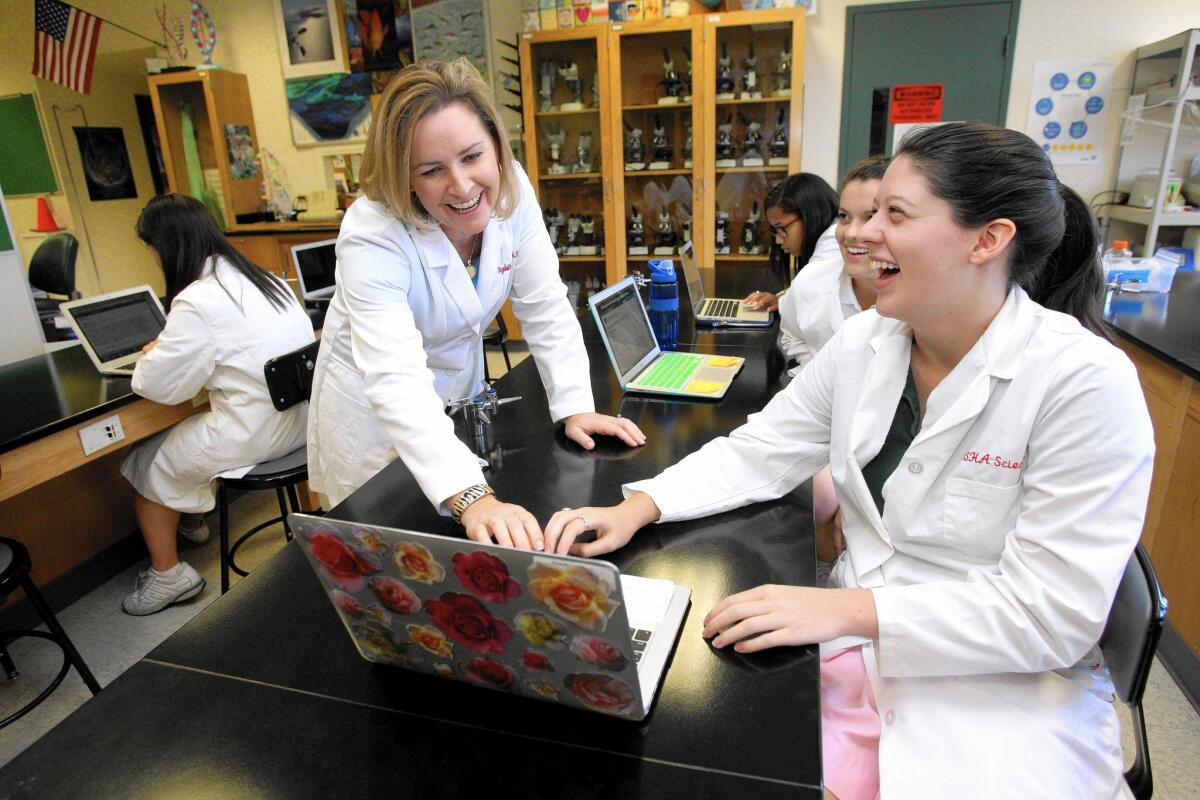Students get an early, hands-on science experience

Flintridge Sacred Heart Academy science teacher Dr. Elizabeth Krider, left, goes over potential subjects of study with senior Danielle Fradet, right, in the honors scientific research class at the La Cañada Flintridge school on Friday, Sept. 25, 2015.
- Share via
Flintridge Sacred Heart Academy senior Kelly Fradet may not know exactly what career path she will take after high school, but with an internship at Boeing already under her belt, her passions are pushing her toward advanced work in science and engineering.
Fellow senior Laura DiPietro is interested in conducting botanical research in hopes of making advancements in agricultural development and food science that could reduce or diminish global malnutrition.
Following a typical academic course, it would likely take more than a decade of study before Fradet and DiPietro could begin making meaningful contributions in their chosen fields.
But a new class offering — honors scientific research — aims to cut down that long lead time by exposing students to the rigors of high-level science while their careers are still in the formative stages.
The yearlong class was conceived by faculty, board members and FSHA alumni as a way to provide participants with a research immersion experience prior to college, one most students don’t get access to until graduate school, according to instructor Dr. Elizabeth Krider.
“When they can participate in the discovery process, they’re much more likely to see themselves as participating and engaging in science,” Krider said. “That’s a very powerful experience.”
As the year progresses, the students will zero in on the kinds of problems they’d like to solve and the fields of study they might pursue in college, graduate school and in their careers, the instructor added.
The first semester focuses on basic lab skills and how to read, understand and validate scientific studies. Students are also developing ideas for the research projects they will conduct in the second semester of the class.
“The end goal is a hands-on research experience where they conceive of the project and they learn to read the literature in a critical way that will help them design their experiments,” Krider said of the curriculum.
All FSHA students are required to produce research projects their junior and senior years, regardless of their fields of interest. For girls like Fradet and DiPietro, who are inclined toward science, the work conducted in the honors scientific research fulfills the senior year requirement.
In April, students will present the findings of their research in a school-wide assembly, which will offer a valuable lesson about defending one’s work, Krider said.
Fradet said she’s excited at the prospect of learning how to do research that could someday have an impact on society.
“This was just another opportunity to jump on, to start making a difference even though I’m 17,” she said of the class.
A recent Friday morning found Fradet, et al., in full lab attire, preparing gel samples to be read through electrophoresis. The process uses a negative charge to move dyed cells across a scope where their DNA and RNA can be analyzed.
The assignment is designed to mimic a biotechnical process in which, for example, scientists might get bacteria cells to produce insulin by cutting up the cell’s DNA and introducing new “instructions” for growth, Krider explained.
“They’re cutting up DNA and making something new, but they don’t know what they’ve made yet,” the teacher said. “They get to do exactly what’s done in the industry.”
For DiPietro, the exposure to real-world science as a high-schooler was a big draw.
“This class provides us with the tools to start making these valid contributions to the scientific world,” she said. “That’s what I want to do with my career, and my life.”
